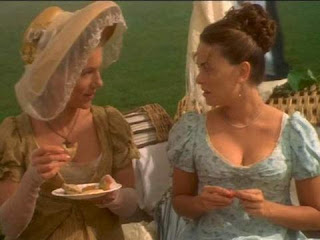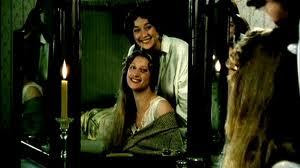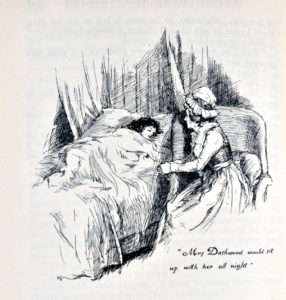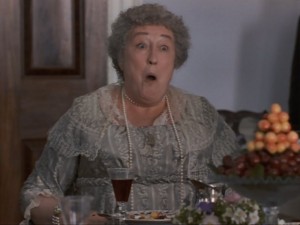Amanda mentioned in her post about JASNA that one of the highlights was Andrew Davies’ presentation in which he talked about his Austen screenplays. He’s such a good speaker that I found myself writing notes–oh my gosh, I must tell the Riskies about this!–and so I thought I’d share what he said about his various screenplays, and also about the cast and crew comments that prompted changes and rewrites (as well as the inside jokes). First, he has a huge oeuvre–minds out of the gutter ladies, although he’d probably appreciate it–check it out. He’s got a lot of projects on the boil including a novel based on his childhood as well as other screenplays. I asked him if he’d tackle Mansfield Park because I think he could do amazing things with it and he said he was asked that fairly often. (I also told him I was chaperoning Amanda and not to squeeze her too tightly when we were photographed together.)
 Talking of photos, mine were abysmal, so I borrowed this one from Austenprose (thanks, Laurel Ann!). This was taken on the grand parade in Sundance Square. Now I do have to admit that some things about the conference were a bit weird, like running into people who wore their regency stuff all the time even outside the hotel. But on Sunday night when we were all dressed up we had an official parade outside where people took our pics and seemed entertained/bemused. Mr. Davies, as guest of honor, was escorted by two lovely tall blonde Texans who were dressed up in their western gear (and honest, in Texas you do get dressed up in a stetson and cowboy boots. It can look very chic). You can’t see it in the pic but their Stetsons featured flashing jewels and they claimed to be the Blingley Sisters.
Talking of photos, mine were abysmal, so I borrowed this one from Austenprose (thanks, Laurel Ann!). This was taken on the grand parade in Sundance Square. Now I do have to admit that some things about the conference were a bit weird, like running into people who wore their regency stuff all the time even outside the hotel. But on Sunday night when we were all dressed up we had an official parade outside where people took our pics and seemed entertained/bemused. Mr. Davies, as guest of honor, was escorted by two lovely tall blonde Texans who were dressed up in their western gear (and honest, in Texas you do get dressed up in a stetson and cowboy boots. It can look very chic). You can’t see it in the pic but their Stetsons featured flashing jewels and they claimed to be the Blingley Sisters.
 The conference was about Sense & Sensibility and Mr. Davies explained that he started his screenplay with Willoughby seducing Eliza because this–not the Dashwood deaths with which the book begins–for him is the real start of the story. It was very much an anti-Willoughby interpretation–he described him as “a glamorous shit”–but like many of us he had problems with this novel. It’s too much “about girls filling in their time waiting by the phone for unsatisfactory men who don’t respond in the right way.”
The conference was about Sense & Sensibility and Mr. Davies explained that he started his screenplay with Willoughby seducing Eliza because this–not the Dashwood deaths with which the book begins–for him is the real start of the story. It was very much an anti-Willoughby interpretation–he described him as “a glamorous shit”–but like many of us he had problems with this novel. It’s too much “about girls filling in their time waiting by the phone for unsatisfactory men who don’t respond in the right way.”
 And then there’s Edward–how do you explain a hero who’s too scared to break off an engagement to a woman he no longer loves, and lies to and deceives both her and the woman he really does love? So he inserted a scene in which Edward pours out his heart to Elinor about his family’s expectations and how he wants to be a simple country parson–heck, they virtually do each others’ nails–which naturally led the women involved in the production to complain that now he wasn’t butch enough. Hence the woodchopping scene (ooh, wet shirt), inspired by a woodcutting scene in Davies’ favorite movie, Shane. Incidentally, if you are familiar with English slang you’ll appreciate the hilarity of the cast when Fanny[‘s] hair was mentioned.
And then there’s Edward–how do you explain a hero who’s too scared to break off an engagement to a woman he no longer loves, and lies to and deceives both her and the woman he really does love? So he inserted a scene in which Edward pours out his heart to Elinor about his family’s expectations and how he wants to be a simple country parson–heck, they virtually do each others’ nails–which naturally led the women involved in the production to complain that now he wasn’t butch enough. Hence the woodchopping scene (ooh, wet shirt), inspired by a woodcutting scene in Davies’ favorite movie, Shane. Incidentally, if you are familiar with English slang you’ll appreciate the hilarity of the cast when Fanny[‘s] hair was mentioned.
I also loved what he had to say about Emma, which was the underappreciated version starring Kate Beckinsale. There’s a very long and funny story about the scene with Emma, Knightley and the baby which I won’t relate here, but he had these extremely perceptive comments about the novel:
She’s a fearful snob with no insight whatsoever who treats other people as though they were dolls or toys. Either she’s very young and a slow developer, or she’s an artist, a creator, a novelist who’s too lazy to write… Austen always has a girl or two who are disadvantaged and succeed despite the efforts of a rich bitch…
in this case the rich bitch is our heroine Emma and the disadvantaged girl Jane Fairfax:
 Jane Fairfax is possessed of a deep and passionate nature. She’s had the misfortune to fall in love with a handsome psychopath; she’s sexually in thrall to a man she has little respect for.
Jane Fairfax is possessed of a deep and passionate nature. She’s had the misfortune to fall in love with a handsome psychopath; she’s sexually in thrall to a man she has little respect for.
He believes Frank did seduce her in Weymouth and he also mused on Mr. Knightley visiting the Woodhouses every day for years. Why? Not to visit Mr. Woodhouse, surely. He proposed a Tennessee Williams-like scenario in which the young Mr. Knightley visited Mrs. Woodhouse and then transferred his affections to her daughter (hopefully after Emma was 16 or so). Yikes.
 And, oh yes, P&P, wet shirt and all, and the title of this post is what Davies saw as the governing idea behind the book–sex, money, and physicality. It explains why he saw the beginning of the story, not with the famous quote, but with Bingley leasing Netherfield, hence masculine guys galloping around on big horses (with Elizabeth being “strangely excited” when she sees them from a distance).
And, oh yes, P&P, wet shirt and all, and the title of this post is what Davies saw as the governing idea behind the book–sex, money, and physicality. It explains why he saw the beginning of the story, not with the famous quote, but with Bingley leasing Netherfield, hence masculine guys galloping around on big horses (with Elizabeth being “strangely excited” when she sees them from a distance).
 After that it was a question of finding as many opportunities as possible for undressing. The film crew referred to his frequent scenes where Lizzy and Jane exchange confidences in their nightgowns as “hair and shoulders shots.”
After that it was a question of finding as many opportunities as possible for undressing. The film crew referred to his frequent scenes where Lizzy and Jane exchange confidences in their nightgowns as “hair and shoulders shots.”
 He decided to bring Georgianna much more into the story, originally to show “Darcy being tender with girls.” As he pointed out, until Georgianna shows up we’re not even sure Darcy likes women. But I was surprised to learn that his favorite scene is with Georgianna, Elizabeth, Darcy and the Bingleys and as it opens Elizabeth sings an aria from The Marriage of Figaro. As Georgianna plays next, Miss Bingley makes snide comments about the regiment moving to Brighton and brings up Wickham’s name. Georgianna stumbles on a note at the piano and Elizabeth moves in to protect her, apologizing that she should have realized the music was too difficult to play without someone to turn the pages. She and Darcy exchange one of those long, significant glances (ooh).
He decided to bring Georgianna much more into the story, originally to show “Darcy being tender with girls.” As he pointed out, until Georgianna shows up we’re not even sure Darcy likes women. But I was surprised to learn that his favorite scene is with Georgianna, Elizabeth, Darcy and the Bingleys and as it opens Elizabeth sings an aria from The Marriage of Figaro. As Georgianna plays next, Miss Bingley makes snide comments about the regiment moving to Brighton and brings up Wickham’s name. Georgianna stumbles on a note at the piano and Elizabeth moves in to protect her, apologizing that she should have realized the music was too difficult to play without someone to turn the pages. She and Darcy exchange one of those long, significant glances (ooh).
What’s your favorite Davies’ screenplay? And do you agree or disagree with what he said about the novels?
Alert! Last day to enter the contest on my website (yes I know it says October 26 but it’s still up so go for it) and you have a chance to win a copy of Jane Austen: Blood Persuasion at My Jane Austen Book Club.












